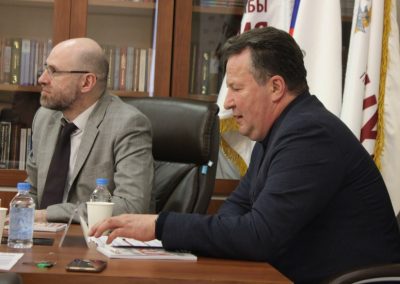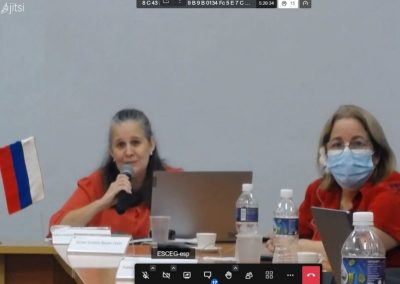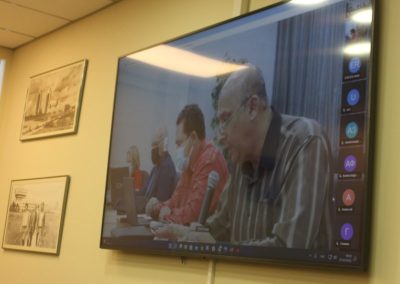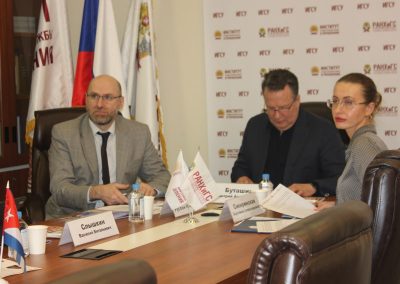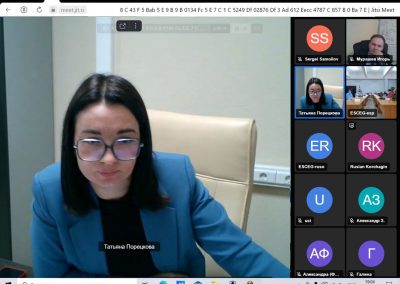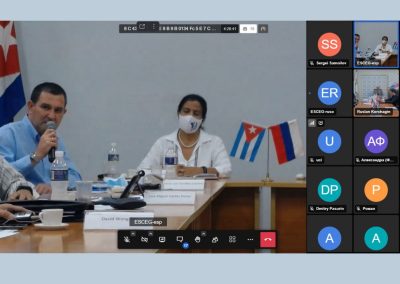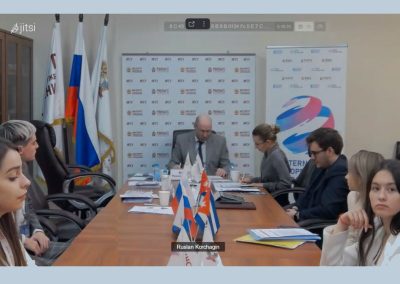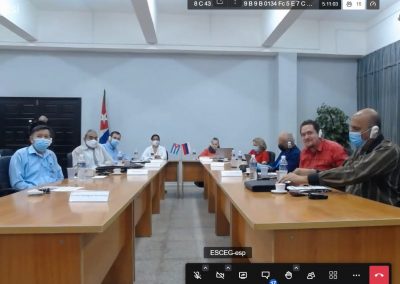The IPACS RANEPA hosted a Russian-Cuban expert discussion on the topic of modern public administration
On April 7, 2022, the Institute of Public Administration and Civil Service RANEPA held a Russian-Cuban expert discussion on the topic “Digital Transformation for the State of the Future”. It was attended by representatives of the RANEPA and representatives of various Cuban organizations, including the Higher School for Training Personnel of the State and Government of Cuba and the Ministry of Communications and Communications of Cuba.
Cooperation with Cuban colleagues was highly appreciated by RANEPA Vice-Rector – Dmitry Butashin. He said opening the meeting: “Since 2019, when the pandemic began, we have not always been able to meet in person, but during this time we managed to do a lot by holding a number of useful events. The topic of today’s discussion is especially interesting: Russia has achieved significant success in the field of digital transformation and we have something to share with our Cuban colleagues.” Vice-Rector also noted the importance of international expert exchange of experience as an important part of international cooperation in the field of education.
Rector of the Higher School of Training of the State and Government of Cuba Mercedes Delgado Fernandez made a presentation on “Training of Personnel for Innovative Digital Transformation Projects”. She stressed that the main competence of personnel today is the management of innovative projects. New competencies imply a restructuring of work towards leadership, creativity, teamwork and improvement of communication processes.
Ruslan Korchagin, acting Director of the IPACS RANEPA, drew the attention of the audience to the participation in the conference of Russian leading companies in the field of digitalization. The head of the institute said that in Russia the concept of digital transformation has been adopted at the state level, a regulatory framework has been developed and a strategy has been developed, based primarily on three components: artificial intelligence, big data and the Internet of things. He also drew the attention of Cuban colleagues to the practice of creating departments for training specialists in the field of digitalization based on educational institutions, which has already given a great positive result.
The moderator of the meeting, Karolina Sikirinskaya Head of the International Cooperation Department IPACS RANEPA, thanked the experts for participating in the event, which is significant in terms of changing the landscape of public administration through digital transformation and in the development of Russian-Cuban relations in general. The moderator noted that the development of Russian-Cuban cooperation is one of the key areas in the line of international activity and is being actively worked out on a number of joint initiatives with Cuban partners. “Over the past few years, we have done a lot of project work and we are pleased that the format of interaction with colleagues takes place on a regular basis. Almost every month we hold events between IPACS and the Higher School of Public Personnel Training from round tables to educational modules, so I am sure that such activity will only increase momentum, and the effectiveness of our joint work will allow us to launch a number of significant projects”.
Vasily Slyshkin, director of the State Technologies federal state institution, presented the concept of digital transformation as a national development goal of the Russian Federation: “The components of digital transformation are the “digital maturity” of key sectors of the economy and the social sphere, providing 97% of households with the Internet, more than 95% electronic accessibility socially significant services”. As important tasks, the speaker named an increase by 2030 by 1.25 times in the number of specialists using digital competencies in their work, the further development of the electronic format of public services, and the provision of benefits for domestic IT developers.
Igor Murashev, Deputy Chairman of the Civil Service and Personnel Policy Committee of the Administration of the Governor of St. Petersburg, Head of the Assessment and Personnel Reserves Department, shared St. Petersburg’s experience in introducing information technologies into the personnel management of state bodies. “The personnel portal of the administration of St. Petersburg is a single public access point to the civil service, the architecture of which has 8 levels of data exchange with other information systems. The list of services – vacancies, resumes, personnel reserve, surveys, testing to test knowledge. The full cycle of an official’s activity can be traced in electronic format: from the vacation schedule to career plans and their implementation”.
Tatyana Poretskova, Deputy Director for the Development of Public Services of the State Budgetary Institution of the City of Moscow “Multifunctional Centers for the Provision of Public Services”, presented the audience with the features of the My Documents service. Today, scattered city structures with huge queues of visitors have turned into modern offices with convenient transport accessibility, 90 out of 280 types of services for citizens and small businesses are available in electronic format. The immediate goals of the service are 5 days for issuing a passport of a citizen of the Russian Federation, mastering the format of electronic passports, issuing new generation documents based on biometric data. By 2029, it is planned to introduce paperless document management in the field of real estate registration using an electronic signature.
Maxim Vlasov, Head of Digital Services Development at the Moscow City Innovation Agency, spoke about programs to develop innovative digital solutions in the capital. City authorities, representatives of business and technology companies are involved in their creation. Every year, competitions are held to create digital products using artificial intelligence and machine learning technologies, in which up to 460 teams participate, and the prize fund is 10 million rubles. The agency’s assets include the creation of services for registering and searching for homeless animals, automatic document analysis, the Locator service for business, and 20 more successful projects and 50 new startups.
Sergey Okladnikov, Deputy Head of the Federal State Statistics Service of the Russian Federation, shared his experience of a process approach to the implementation of a digital platform that will become the same for all public authorities. The main problem is personnel, and since 2019 it has been actively solved by improving the skills of employees in the field of digital transformation. An important step was the creation of a basic department of statistics and mathematical methods in public administration at the Presidential Academy. This gave an excellent result in the training of specialists who meet modern requirements for managing big data and who have the skills of economic analysis and forecasting.
At the end of the meeting, Ruslan Korchagin noted that the well-being and security of countries depend on the competencies of civil servants. Mercedes Delgado Fernandez, in turn, assured that “despite the difficult scenario that the planet is currently going through, our peoples will always be united on the path to cooperation leading to the prosperity of our states”.



